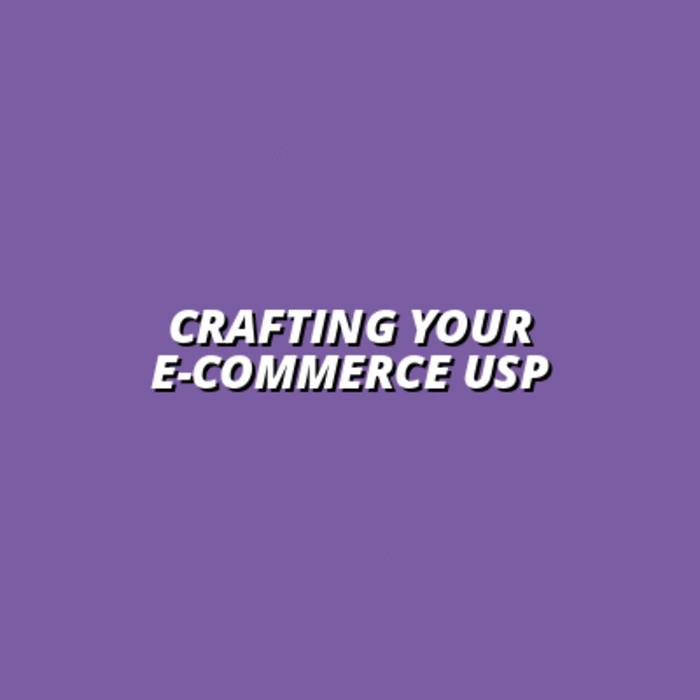Crafting Your E-commerce USP

Posted on: 2025-11-06
By: Liam Corbin
In today's bustling e-commerce landscape, your Unique Selling Proposition (USP) can be the differentiator that propels your business to success. Think about this: what sets you apart from thousands of competitors online? Understanding and articulating your USP not only helps you capture attention but also fosters a deeper connection with your audience. This article offers insights on crafting a compelling USP that resonates.
What You Will Learn
- The definition and significance of a Unique Selling Proposition (USP) in e-commerce.
- Key elements that contribute to a compelling USP, such as quality, service, and customer experience.
- How to align your USP with customer pain points and values for deeper resonance.
- The importance of understanding your target audience and customer personas in shaping your USP.
- The difference between a value proposition and a USP, and how they complement each other.
- Practical steps to create and implement your USP effectively in your e-commerce strategy.
- Resources and tools to enhance your understanding and execution of a compelling USP.
Key Elements of a Compelling E-commerce Unique Selling Proposition (USP)
Understanding the critical aspects that differentiate your brand can significantly impact your e-commerce success. Explore the key elements below. For more insights on expanding your brand's reach, consider exploring strategies for boosting traffic to your affiliate site.
Brand Differentiation
Identify what makes your brand stand out, focusing on quality, service, and unique experiences.
Addressing Customer Pain Points
Align your USP with customer challenges and values to create meaningful connections.
Understanding Customer Personas
Know your audience's demographics and preferences to tailor your USP effectively.
Value Proposition vs USP
Differentiate between the broader benefits your product offers and the unique features that set you apart.
Understanding the Unique Selling Proposition in E-commerce
When diving into the world of e-commerce, one term you’ll often hear is the Unique Selling Proposition, or USP. At its core, your USP is what sets your business apart from the competition. It’s that special thing that makes your offer unique and irresistible to your target audience. In a crowded online marketplace, having a clearly defined USP can be the difference between thriving or just surviving.
So, why should you care about a USP? Because it’s more than just a catchy phrase. It’s the foundation of your branding and marketing strategies. A strong USP communicates the value you provide, making it easier for customers to understand why they should choose your products or services over others. As someone passionate about helping individuals create automated income streams, I can assure you that nailing down your USP is a critical step in building a successful e-commerce venture.
Defining Unique Selling Proposition (USP) for E-commerce
What is a Unique Selling Proposition?
A Unique Selling Proposition is essentially the one thing that makes your business different from others in your niche. Think of it as your business's personality or the main reason customers should buy from you. For example, if you’re selling handmade products, your USP might focus on the craftsmanship and personal touch that mass-produced items lack.
Your USP should reflect your values and what your brand stands for, whether it’s quality, service, innovation, or convenience. It’s important to articulate this in a way that resonates with your audience. When I started The Cash Automator, I focused on empowering individuals, which has become a key part of our USP. It’s about showing your audience what makes you, *you*! To delve deeper into empowering your online presence, explore how to automate your brand's online presence.
The Importance of USP in E-commerce
In e-commerce, having a compelling USP is vital for capturing attention and driving conversions. With countless options available online, today’s consumers need a clear reason to choose you. A well-defined USP helps create *brand loyalty* and trust. It communicates not just what you sell, but why it matters to your customers.
Moreover, a unique proposition can guide various aspects of your business, from product development to marketing strategies. It allows you to focus on what truly sets you apart and ensures your messaging remains consistent across all platforms. If you're ready to take your e-commerce game to the next level, identifying your USP is a crucial first step!
Key Elements of a Compelling E-commerce USP
Brand Differentiation and Competitive Advantages
To develop a standout USP, you should first identify what makes your brand different. Consider these aspects:
- Quality: Are your products superior in terms of materials or craftsmanship?
- Service: Do you offer exceptional customer service that exceeds expectations?
- Price: Can you deliver unique value at a competitive price point?
- Experience: Do you provide a shopping experience that feels personalized and engaging?
These elements can help you carve out a niche in the market. Remember, *consistency* is key! Ensure that your branding reflects your unique advantages and resonates with your audience.
Aligning USP with Customer Pain Points and Values
Your USP should not only highlight what makes you special but also address your customers' challenges. What problems do they face, and how does your offering provide a solution? Understanding your audience's pain points allows you to align your USP effectively with their values.
For instance, if your target market values sustainability, showcasing eco-friendly practices as part of your USP can make a significant impact. At The Cash Automator, I emphasize empowering users through automated income strategies, which directly addresses their desire for financial independence. Your USP should echo the sentiments and needs of your audience!
Understanding Customer Personas and Target Audience
A deep understanding of your customer personas will help shape your USP. Start by identifying who your ideal customers are, what their interests are, and what drives their purchasing decisions. Here are some questions to consider:
- What demographics do they fall under?
- What challenges do they face in their daily lives?
- How do they prefer to shop and receive products?
The more you know about your audience, the better you can tailor your USP to meet their specific needs and desires. For further reading on this topic, check out E-commerce Customer Behavior Explained.
Value Proposition vs Unique Selling Proposition
While a USP emphasizes what makes your business unique, a value proposition focuses on the overall benefits your product offers. Think of your value proposition as the broader picture: it answers the question, *What value will the customer gain from using your product?* In contrast, your USP highlights the distinctive features that set you apart from competitors.
Both are essential components of your marketing strategy, but they serve different purposes. A strong USP can enhance your value proposition, making it compelling and relevant to your target audience. By combining these elements effectively, you can create a powerful message that resonates deeply with potential customers.
Pro Tip
When crafting your Unique Selling Proposition, consider conducting A/B testing with different versions of your USP. This approach allows you to see which message resonates most with your audience, leading to better engagement and conversion rates. Don’t be afraid to iterate and refine your USP based on real feedback!
Frequently Asked Questions (FAQs) About Unique Selling Propositions
Key Takeaways on Creating a Unique Selling Proposition
As we wrap up our discussion on the importance of a Unique Selling Proposition (USP) in e-commerce, let's take a moment to reflect on why it truly matters. A well-defined USP not only sets your brand apart from the competition but also resonates with your customers on a deeper level. It’s the heart of your marketing strategy and can significantly impact your sales and growth!
In a crowded online marketplace, having a clear USP helps potential customers understand what makes your offering special. It can be the reason they choose your product over another, fostering loyalty and repeat business. Remember, a compelling USP is not just a tagline; it's a promise of value that you consistently deliver on!
Recap of the Importance of USPs in E-commerce
To summarize, here are the key points that highlight the importance of a strong USP:
- Differentiation: It sets your brand apart in a competitive market.
- Customer Connection: It aligns with customer values and pain points.
- Increased Loyalty: A clear USP encourages customer trust and repeat purchases.
- Effective Marketing: It enhances your marketing efforts across various channels.
By developing a strong USP, you’re not just creating a marketing tool; you’re building a foundation for your brand's identity. And that’s something I’m passionate about at The Cash Automator. We want to equip you with the knowledge you need to stand out!
Final Thoughts on Crafting a Unique Selling Proposition
Crafting a Unique Selling Proposition requires thoughtful consideration of your brand’s values, your audience's needs, and your competitive landscape. It’s about finding the sweet spot where these elements intersect, and that’s where your USP shines. The journey might take some time, but the results will be worth it!
In my experience, the most successful brands continuously refine their USPs as they grow and adapt to changing market conditions. So, don't hesitate to revisit and adjust your USP as necessary. The world of e-commerce is dynamic, and staying relevant is key! You can also boost your sales by understanding how to boost e-commerce customer loyalty.
Encouraging Action for E-commerce Success
Next Steps: Creating and Implementing Your USP
Now that we’ve explored the nuances of USPs, it’s time for action! Here are some practical steps to guide you in creating and implementing your USP:
- Identify your brand's core values and mission.
- Conduct research to understand your target audience better.
- Analyze your competition to spot gaps and opportunities.
- Draft your USP and test it with your audience for feedback.
Following these steps will position your brand for success as you carve out your unique space in the e-commerce realm. At The Cash Automator, we believe in empowering you to take these actionable steps toward financial freedom!
Resources and Tools for Further Exploration
To further enhance your understanding of creating a compelling USP, consider exploring the following resources and tools:
- Data Analytics: Utilize analytics tools to segment your market and identify target demographics.
- E-commerce Platforms: Research platforms like Shopify and WooCommerce that can help you implement your USP effectively.
- Online Marketplaces: Explore avenues like Amazon and Etsy to see how successful brands present their USPs.
By utilizing these resources, you'll be better equipped to refine your approach, ensuring that your USP resonates with your audience. Let’s take the next steps together toward building a successful e-commerce business! Are you ready to make your mark? Let's do this! For more in-depth strategies on selling your products, consider diving into crafting self-selling digital products.
Recap of Key Points
Here is a quick recap of the important points discussed in the article:
- Define Your USP: Clearly articulate what makes your brand unique compared to competitors.
- Address Customer Pain Points: Align your USP with the challenges and values of your target audience.
- Understand Your Audience: Develop customer personas to tailor your messaging effectively.
- Differentiate Your Brand: Focus on key elements like quality, service, and experience to stand out in the marketplace.
- Integrate with Marketing Strategy: Use your USP as a foundation for all branding and marketing efforts.
- Continuous Refinement: Regularly revisit and adjust your USP to stay relevant in a dynamic market.
 As we stand on the brink of a transformative era defined by automation, the landscape of income dyna
As we stand on the brink of a transformative era defined by automation, the landscape of income dyna
 Content marketing is more than just a buzzword; it's the backbone of successful affiliate marketing.
Content marketing is more than just a buzzword; it's the backbone of successful affiliate marketing.
 Did you know that nearly 70% of consumers rely on content from resource pages to make informed purch
Did you know that nearly 70% of consumers rely on content from resource pages to make informed purch